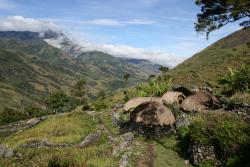Working alongside our global neighbours, co-developing knowledge and sharing expertise as we rapidly respond to similar climate change impacts.
Successful adaptation to the challenges of rising temperatures and sea levels requires collaborative action on an international level.
We have applied our expertise in engaging communities in planning for climate change and identifying adaptation actions in the Pacific Island nations of Kiribati, Tonga and Papua New Guinea and South Asian countries of Bangladesh, Pakistan and Sri Lanka.
Graduate studies in this expertise area
- Adaptive co-management of small tank cascade systems of Sri Lanka in a changing climate – PhD Bhathiya Kekulandala (in progress)
- Women’s role in adaptation to climate change in coastal Bangladesh – PhD Momtaj Khalil (in progress)
- Traditional Ecological Knowledge and Ecosystems Services for Environmental Governance in a Post-Conflict Scenario in the Colombian Amazon A Case Study with Kakua People – PhD Paloma Alvarez (in progress)
- Agricultural vulnerability to climate change at district level in Pakistan – PhD Faisal Nadeem (in progress)
PROJECT | 2016-2020
Engaging communities and government in biodiversity conservation and climate adaptation in Papua New Guinea
Funded by USAID, this project sought to empower communities in Papua New Guinea to lead their adaptation responses to climate change.
PROJECT | 2018-2021
From urban waste to sustainable value chains: linking sanitation and agriculture through innovative partnerships in Sri Lanka
This applied research project in Sri Lanka connects the waste management, sanitation and agriculture sectors through the circular economy, to improve food security and environmental health. This project is a partnership between ISF, the International Water Management Institute, Janathakshan Ltd, Sabaragamuwa University of Sri Lanka and the Sri Lankan Department of Agriculture.
PROJECT | 2016
Dynamic Adaptation Management Pathways for remote water supplies
This USAID funded project conducted a series of community workshops in the pacific island nation of Kiribati to train communities to identify viable water sources under a changing climate. A Dynamic Adaptive Management Process (DAMP) handbook was then developed to build the knowledge and skills of facilitators to lead participatory community decision-making processes to respond to fresh water shortages in Kiribati. It provides facilitators with a range of tools for leading conversations at the community level. It also helps to build skills and knowledge that will enable the community to participate in identifying relevant and appropriate solutions for their context.
To build the capacity to identify indicators/triggers among communities in the outer islands of Kiribati, the DAMP approach drew on various knowledge systems – including traditional knowledge – to define the limits of specific water-related adaptation strategies. This will empower them to monitor adaptation strategies and subsequently contribute to the development of future adaptation strategies that will support the diversification of water resources.
The DAMP handbook draws on the experience of the authors and outcomes of a training workshop, and is aimed at community facilitators from non-government organisations, local and national governments, and service providers. It outlines a set of tools to better understand the impacts of climate change on possible water supply options and identify triggers for when a new water option should be planned. The tools and processes that are presented are flexible enough to be applied to a range of situations and sectors.
Client: USAID
RESEARCH OUTPUTS
Dynamic Adaptive Management Process: A Facilitators Guide (Guide)
A Knowledge Network Approach to Understanding Water Shortage Adaptation in Kiribati (2020) (Book Chapter)
Media
Islands of Resilience: USAID partners with island nation Kiribati to address the climate crisis - USAID website, April 2022
View more projects
PROJECT | 2016-2019
PACAM climate resilience and biodiversity in Papua New Guinea
This project focused on biodiversity conservation and climate change adaptation. Researchers used a ‘train the trainer’ approach to build capacity and promote the adoption of systems thinking in local planning, management and decision-making processes. In this way, biodiversity and adaptation considerations were incorporated into initial prioritisation processes and can be 'mainstreamed' into any future actions.
Client: Pacific American Climate Fund
Researchers: Brent Jacobs, Louise Boronyak, Kylie McKenna
PROJECT | 2016-2017
Towards Phosphorus and Climate Smart Agriculture (PACSA) in Sri Lanka
Two of the biggest global challenges for food security – phosphorus scarcity and climate change – are threatening farmers’ livelihoods, agricultural productivity and environmental integrity. Risks are particularly high in low-to-middle income Asia-Pacific countries, yet remain insufficiently assessed or mitigated. This project investigated the capacity of smallholder farmers and policy-makers in Sri Lanka to adapt to these twin challenges via development and testing of a novel rapid integrated vulnerability assessment framework.
Adoption of the framework by key stakeholders increased adaptive capacity, ultimately improving the livelihoods of small farming families, national food security, and environmental integrity of agricultural land and waterways.
Client: UTS
Researchers: Dana Cordell, Brent Jacobs, Elsa Dominish
PROJECT | 2011-2012
Community-based climate adaptation in the Pacific
In 2012, ISF assisted NGO Plan International and Pacific-based partners FSPI to develop their Pacific program for community-based climate change adaptation. The program spanned five Pacific Island countries and formed the basis of ISF's continued work in the region.
Client: Plan International Australia
Researchers: Pierre Mukheibir, Louise Boronyak, Brent Jacobs, Rebecca Cunningham, Federico Davila
PROJECT
Irish P-Change workshop
This workshop engaged stakeholders in Ireland to develop a 'Change Model' for Ireland's phosphorus value chain, based on the processes used for North America in 2015.
Clients: Queens University of Belfast, Irish EPA
Researchers: Dana Cordell, Brent Jacobs


